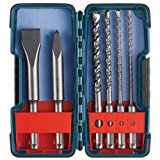If you have ever tried to drill holes in concrete using a regular drill and a high-speed steel drill bit, you know that it is a useless exercise. High-speed drill bits are perfect for drilling through wood, which is fibrous—the best way to make a hole in wood is to cut or slice your way through. The job goes faster with the sharper your drill bit is.
Regular twist drill bits are sharp at the tip as well as down the edges of their spiral flutes. Well made twist drill bits stay sharp for a long time; however, they become dull if they are exposed to hitting too many nails. Twist drill bits and regular drills can also make holes in metals, including steel. However, you can drill for a longer period if you use a drill bit made of material that is harder than high-speed steel, such as titanium or cobalt.
Drilling in concrete is a whole different ball of wax. Concrete is granular, where wood is fibrous and metals are generally smooth and monolithic. Concrete is made of grains of sand and chunks of gravel glued together with cement. Trying to drill through concrete with a regular drill bit or even a titanium or cobalt drill bit will dull the bit as fast as sandpaper. You cannot cut or slice concrete; you macerate it and pull apart the grains. When you clear away the powder of concrete, your hole is there.
Masonry drill bits were invented to drill through concrete. Masonry drill bits are a wedge of carbide, which is only a little less tough than diamond, which is attached to a spiral shaft. The shaft is not intended to stay sharp, but rather to gather the resulting powder and pull it out of the hole. The shanks of masonry drill bits are smooth and either hex-shaped or rounded. They can be used in your regular drill to drill through concrete, albeit quite slowly. If you need to make larger holes in concrete, then masonry drill bits are not going to meet the grade. You will need a hammer drill or a rotary hammer to achieve larger holes in concrete.
